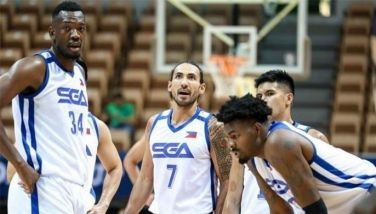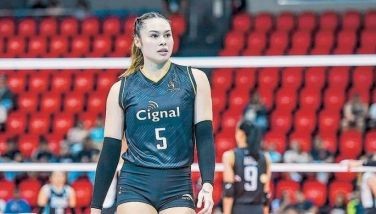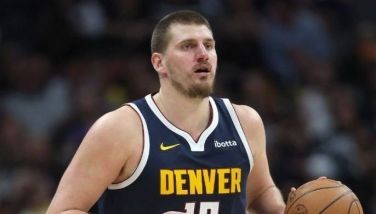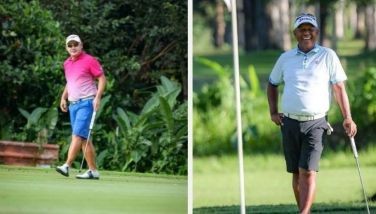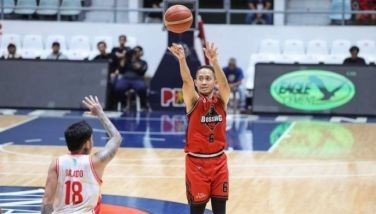Passion for sports - SPORTING CHANCE By Joaquin M. Henson
December 14, 2000 | 12:00am
BEAVERTON, Oregon — At Nike, the corporate message is loud and clear — "We are in love with sports."
Talking to officers and staff alike, you hear the same refrain. They share a common passion for sports — they enjoy their work — and they "just do it."
Nike pioneer Jeff Hollister, 54, traced the origins of the company to University of Oregon track coach Bill Bowerman and his runner Phil Knight in 1957. Bowerman handcrafted shoes that his tracksters used to break records. After graduation at the Stanford Business School, Knight went to Tokyo and arranged to bring in Tiger shoes to the US. He teamed up with Bowerman in 1964, contributing $500 each to the marketing arm for Tiger and got a $50,000 loan from Japanese businessmen.
In 1971, Bowerman and Knight set up their own shoe line. A student Carolyn Davidson was paid a princely sum of $35 for a logo which is now universally known as the swoosh. Nike went on to become the world’s largest sports footwear and apparel company.
To this day, Knight remains close to the Japanese market. The Japanese influence is apparent in the design of the campus — prominent is the serene Japanese gardens. The colors, the use of rice paper, and architectural lines reflect a Japanese orientation in designing the headquarters. Obviously, Knight hasn’t forgotten his humble beginnings. His sense of loyalty is the reason why buildings on campus are dedicated to Alberto Salazar, Bo Jackson, Steve Prefontaine, John McEnroe, Joan Benoit, Nolan Ryan, Mike Schmidt, and Michael Jordan.
Nike’s edge over competition is its technology. No other brand spends as much time and resources as Nike in improving products. In 1991, Nike became the world’s first sports company to surpass $3 Billion in sales.
Hollister, who used to run for Bowerman at Oregon, said it is Knight’s philosophy to take risks in introducing new products in the market. That’s the price to pay for being a market leader. He noted that Nike has lately developed music products, timing devices and radical technological innovations such as chips in soles to monitor speed and virtual "walkie talkies" in shoes.
It was Hollister who created Nike’s aquasock which sold 40,000 pairs in its first month.
Hollister said former Portland Trail Blazers guard Geoff Petrie was Nike’s first basketball endorser in 1977.
Ken Link, Nike’s basketball footwear designer, said there are products queued up to the year 2002. According to Link, the "Ferrari" of Nike’s hoops line is the foam-posit which was designed for Kevin Garnett. But even as Garnett has gone to AND 1, Link said the shoe can stand on its own.
"It’s not about the guy," he went on. "It has to do with Nike – that we make the best shoe in the planet. We’ve got the freedom to experiment with designs and technology – we owe that to Mr. Knight who’s a maverick himself. Our thinking is shoes are a player’s weapons for their feet. In making a shoe, 50 percent is development and 50 percent is design. We sit down with athletes and get their inputs so we can produce a shoe that improves their performance – that’s what it’s all about."
Link said Gary Payton’s shoes feature the "monkey paw," an interior brace to protect his ankles since the Seattle guard is a blur on the court. "GP brings excitement to the game and his shoes allow him to do some of the unpredictable things he does," continued Link. "It’s the same with Vince (Carter) who’s extremely athletic. He wears the shoe because he’s a high-flyer, much like the dunking artists of the ’70s. Jason Kidd is the ultimate test – his shoes give him versatility."
Link said Nike has developed an interior mold that attaches to a stretch lycra shell known as the "second skin." The same mold can fit into several colorful shells, each identified with an endorser – Scottie Pippen, Kidd, and Payton.
"We’re not afraid to innovate," said Link. "We anticipate the needs of the athlete – that’s why we’re developing a post-game shoe because we notice, after a game, a player just wears slippers or some kind of slip-ons. We want to protect his feet."
Link said in the works are a lightweight 11-ounce basketball shoe without seams to suit a player like Damon Stoudamire, off-court shoes called the Presto Cage, a model called Air Posterize for players to use in executing highlight plays.
In Nike’s research lab, Dr. Mario Lafortune runs the show. There are almost 50 in his staff — researchers, biomechanic specialists, and testers. Dr. Lafortune is in close contact with athletes like Tiger Woods, Chamique Holdsclaw, Michael Jordan, Mia Hamm, Marion Jones and Lance Armstrong to determine the type of shoes they require to improve their performance.
Dr. Lafortune has millions of dollars worth of testing equipment as his disposal, including cameras that take 200 to 4,000 pictures a second to provide analytical data and a pressure map to measure force on the foot. He has also hooked up with scientists in universities for physiological studies.
Also in Dr. Lafortune’s lab is a 12x18 foot room where footwear and apparel are tested for durability at diffeent temperatures.
"Nike’s scientic research is for understanding the athlete, education and knowledge gathering," said Dr. Lafortune. "Probably 80 percent of our time is spent on researching the needs of the athletes and how the requirements of the game are going to modify or fine-tune those needs."
Dr. Lafortune is involved in testing prototypes before affixing his stamp of approval for final production.
At the end of the tour, we were whisked to Nike’s employee store where accredited shoppers are given the privilege of a 50 percent discount. Now, that was a treat. The store is about double the size of a five-star hotel’s grand ballroom. The place was packed. Philadelphia 76ers coach Larry Brown and some of his players like Matt Geiger and Theo Ratliff also shopped that night.
Nike rolled out the red carpet for Asia’s 3-on-3 champions from Letran high school. It was an early Christmas present for RonJay Enrile, Ira Buyco, Boyet Bautista, and Billy Ray Anabo.
Talking to officers and staff alike, you hear the same refrain. They share a common passion for sports — they enjoy their work — and they "just do it."
Nike pioneer Jeff Hollister, 54, traced the origins of the company to University of Oregon track coach Bill Bowerman and his runner Phil Knight in 1957. Bowerman handcrafted shoes that his tracksters used to break records. After graduation at the Stanford Business School, Knight went to Tokyo and arranged to bring in Tiger shoes to the US. He teamed up with Bowerman in 1964, contributing $500 each to the marketing arm for Tiger and got a $50,000 loan from Japanese businessmen.
In 1971, Bowerman and Knight set up their own shoe line. A student Carolyn Davidson was paid a princely sum of $35 for a logo which is now universally known as the swoosh. Nike went on to become the world’s largest sports footwear and apparel company.
To this day, Knight remains close to the Japanese market. The Japanese influence is apparent in the design of the campus — prominent is the serene Japanese gardens. The colors, the use of rice paper, and architectural lines reflect a Japanese orientation in designing the headquarters. Obviously, Knight hasn’t forgotten his humble beginnings. His sense of loyalty is the reason why buildings on campus are dedicated to Alberto Salazar, Bo Jackson, Steve Prefontaine, John McEnroe, Joan Benoit, Nolan Ryan, Mike Schmidt, and Michael Jordan.
Nike’s edge over competition is its technology. No other brand spends as much time and resources as Nike in improving products. In 1991, Nike became the world’s first sports company to surpass $3 Billion in sales.
Hollister, who used to run for Bowerman at Oregon, said it is Knight’s philosophy to take risks in introducing new products in the market. That’s the price to pay for being a market leader. He noted that Nike has lately developed music products, timing devices and radical technological innovations such as chips in soles to monitor speed and virtual "walkie talkies" in shoes.
It was Hollister who created Nike’s aquasock which sold 40,000 pairs in its first month.
Hollister said former Portland Trail Blazers guard Geoff Petrie was Nike’s first basketball endorser in 1977.
Ken Link, Nike’s basketball footwear designer, said there are products queued up to the year 2002. According to Link, the "Ferrari" of Nike’s hoops line is the foam-posit which was designed for Kevin Garnett. But even as Garnett has gone to AND 1, Link said the shoe can stand on its own.
"It’s not about the guy," he went on. "It has to do with Nike – that we make the best shoe in the planet. We’ve got the freedom to experiment with designs and technology – we owe that to Mr. Knight who’s a maverick himself. Our thinking is shoes are a player’s weapons for their feet. In making a shoe, 50 percent is development and 50 percent is design. We sit down with athletes and get their inputs so we can produce a shoe that improves their performance – that’s what it’s all about."
Link said Gary Payton’s shoes feature the "monkey paw," an interior brace to protect his ankles since the Seattle guard is a blur on the court. "GP brings excitement to the game and his shoes allow him to do some of the unpredictable things he does," continued Link. "It’s the same with Vince (Carter) who’s extremely athletic. He wears the shoe because he’s a high-flyer, much like the dunking artists of the ’70s. Jason Kidd is the ultimate test – his shoes give him versatility."
Link said Nike has developed an interior mold that attaches to a stretch lycra shell known as the "second skin." The same mold can fit into several colorful shells, each identified with an endorser – Scottie Pippen, Kidd, and Payton.
"We’re not afraid to innovate," said Link. "We anticipate the needs of the athlete – that’s why we’re developing a post-game shoe because we notice, after a game, a player just wears slippers or some kind of slip-ons. We want to protect his feet."
Link said in the works are a lightweight 11-ounce basketball shoe without seams to suit a player like Damon Stoudamire, off-court shoes called the Presto Cage, a model called Air Posterize for players to use in executing highlight plays.
In Nike’s research lab, Dr. Mario Lafortune runs the show. There are almost 50 in his staff — researchers, biomechanic specialists, and testers. Dr. Lafortune is in close contact with athletes like Tiger Woods, Chamique Holdsclaw, Michael Jordan, Mia Hamm, Marion Jones and Lance Armstrong to determine the type of shoes they require to improve their performance.
Dr. Lafortune has millions of dollars worth of testing equipment as his disposal, including cameras that take 200 to 4,000 pictures a second to provide analytical data and a pressure map to measure force on the foot. He has also hooked up with scientists in universities for physiological studies.
Also in Dr. Lafortune’s lab is a 12x18 foot room where footwear and apparel are tested for durability at diffeent temperatures.
"Nike’s scientic research is for understanding the athlete, education and knowledge gathering," said Dr. Lafortune. "Probably 80 percent of our time is spent on researching the needs of the athletes and how the requirements of the game are going to modify or fine-tune those needs."
Dr. Lafortune is involved in testing prototypes before affixing his stamp of approval for final production.
At the end of the tour, we were whisked to Nike’s employee store where accredited shoppers are given the privilege of a 50 percent discount. Now, that was a treat. The store is about double the size of a five-star hotel’s grand ballroom. The place was packed. Philadelphia 76ers coach Larry Brown and some of his players like Matt Geiger and Theo Ratliff also shopped that night.
Nike rolled out the red carpet for Asia’s 3-on-3 champions from Letran high school. It was an early Christmas present for RonJay Enrile, Ira Buyco, Boyet Bautista, and Billy Ray Anabo.
BrandSpace Articles
<
>
- Latest
- Trending
Trending
Latest
Trending
Latest
Recommended

















